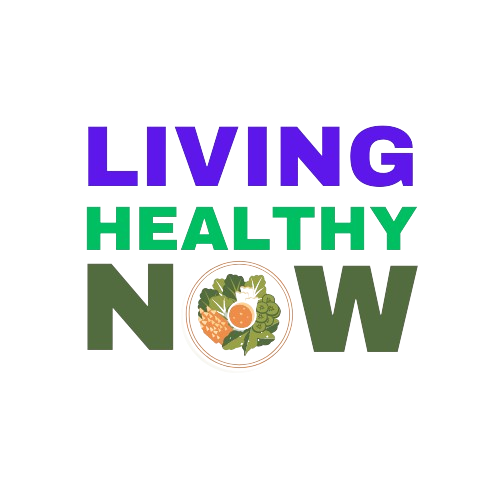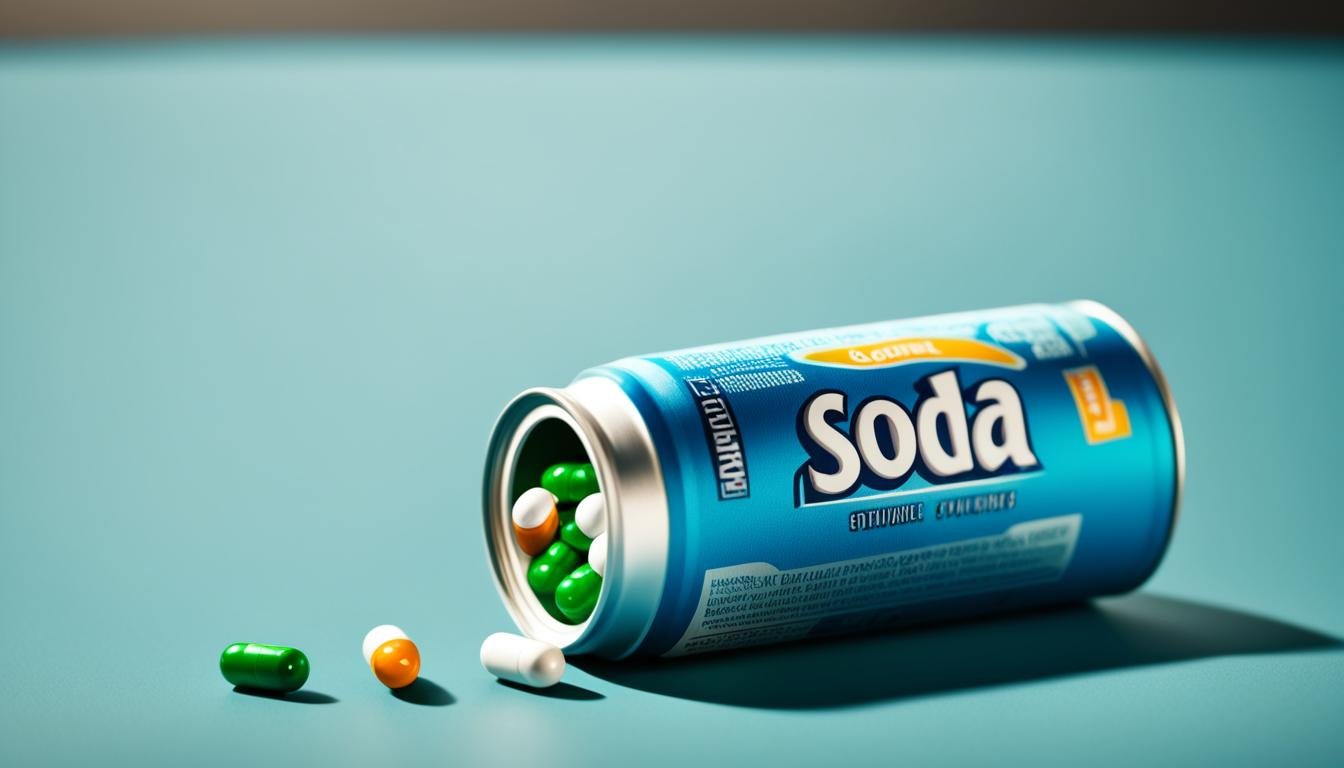In our search for better options, we see artificial sweeteners as guilt-free sweeteners. But, the safety debate has been ongoing for a long time. It’s vital to know the real facts about artificial sweeteners and how they might affect us.
Some studies show that using non-nutritive sweeteners much can be bad for us. For example, women who drank a lot of diet drinks had a higher risk of heart disease and other health issues1. But, these studies don’t always agree, and it’s hard to do perfect research because so many foods have these sweeteners. Most research shows a connection, not direct harm.
Key Takeaways
- Artificial sweeteners may lead to an increased risk of weight gain and other health concerns.
- Consuming artificial sweeteners regularly may offset weight loss or health benefits.
- Artificial sweeteners can overstimulate sugar receptors, affecting how we taste food.
- Research on animals suggests that artificial sweeteners may be highly addictive.
- Stevia, a natural low-calorie sweetener, is 300 times sweeter than sugar with no long-term human health impact studies conducted.
Types of Artificial Sweeteners and Their Safety
Now, let’s talk about artificial sweeteners. The FDA has approved several types. These include saccharin, acesulfame, aspartame, neotame, and sucralose2. Though aspartame, for example, has faced controversy, research has deemed them safe2.
Aspartame: A Controversial yet Safe Sweetener
Aspartame is widely used. You can find it in diet sodas or gum. Despite debates, many studies say aspartame is safe2. Our bodies change aspartame into things found in lots of foods2. It’s even safe for those who use a lot of it2.
Sucralose and Splenda: Widely Accepted as Safe
Sucralose, which is like Splenda, is another option. It’s known to be safe like aspartame2. Even when we have a lot, it’s okay for our blood sugar3.
Some people might have tummy issues with some sweeteners, but most studies show they are safe3. It’s important to use them in moderation and see how your body reacts3.
Don’t forget, natural sweeteners are also available. Stevia, monk fruit, and allulose are some options3. They give people more choices to cut down on sugar3.
| Sweetener | Sweetness Compared to Sugar | Approvals | Potential Concerns |
|---|---|---|---|
| Sucralose (Splenda) | 600 times sweeter | FDA approved | Generally considered safe, but may cause gastrointestinal issues in some individuals |
| Aspartame | 200 times sweeter | FDA approved | Controversial, but extensive research has shown it to be safe for consumption |
| Saccharin | 300-500 times sweeter | FDA approved | Potential cancer risks, but FDA has deemed it safe for use |
| Stevia | 200-300 times sweeter | FDA approved | Generally considered safe, but some individuals may experience side effects like bloating or headaches |
Myths and Misconceptions about Artificial Sweeteners
The Natural vs Artificial Debate
Many think “natural” means good and “artificial” means bad. But this isn’t always true. Some natural things can be more toxic than artificial ones. And many man-made products, even medicines, are safe and helpful5. The fear that artificial sweeteners are always harmful is a myth without proof5.
The FDA in the U.S. allows many sugar substitutes, including Acesulfame potassium and Aspartame5. They also say sugar alcohols like sorbitol are fine5. Organizations worldwide, like the WHO and FDA, find these sweeteners safe in right amounts5.
Natural sugar alternatives like honey and stevia exist. But, they should be used in small amounts due to their sugar6. It’s better to eat foods with less sugar. Also, fresh fruits can sweeten foods and drinks naturally6.
Research is ongoing about the long-term effects of sugar substitutes. It reminds us to use them sparingly and focus on a balanced diet and exercise for good health5.
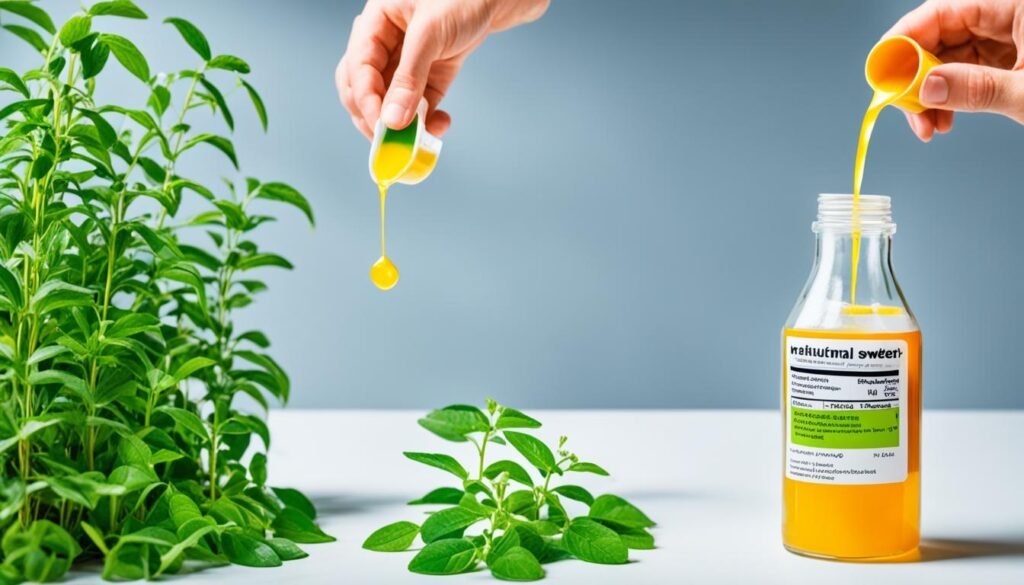
The argument for natural versus artificial sweeteners is complex. Each has its advantages and drawbacks. It’s key to look at facts and what’s best for you when choosing sugar substitutes567.,,
How Artificial Sweeteners Affect Blood Sugar and Insulin
Many think artificial sweeteners spike insulin or harm blood sugar, especially in diabetes8. But many studies say otherwise. They show no bad effect on blood sugar or insulin in both type 1 and 2 diabetics8. Some even find sucralose good for blood sugar8. Plus, switching to these sweeteners from sugary drinks helps with weight loss and sticking to a diet for people with diabetes8.
Artificial sweeteners are very sweet, much more than sugar9. This means foods made with them have less calories. That’s because their sweetness is strong9. They’re seen as “free foods” for diabetics. This is because they’re very low in calories and carbs which don’t much affect blood sugar9.
But, you should be careful with sugar alcohols like mannitol, sorbitol, and xylitol. They can raise blood sugar. And too much can lead to stomach problems like diarrhea9. Choosing artificial sweeteners over sugar may not always be great if you eat or drink a lot of them. This is why we need more study on their overall effect9.
| Sweetener | Sweetness Compared to Sugar | Calories per Gram | Impact on Blood Sugar |
|---|---|---|---|
| Sucralose (Splenda) | 600 times sweeter | 0 calories | No significant impact |
| Aspartame | 200 times sweeter | 4 calories | No significant impact |
| Saccharin | 300-500 times sweeter | 0 calories | No significant impact |
| Stevia | 200-300 times sweeter | 0 calories | No significant impact |
While current science doesn’t show big issues with artificial sweeteners, it’s a complex topic89. We still need to learn a lot about their long-term effects. This is especially true for different groups and how much they use artificial sweeteners10.
are artificial sweeteners bad for you: The Scientific Evidence
The safety of artificial sweeteners is backed by science. They’re considered safe to eat. Many top-notch studies show that sweeteners like aspartame, sucralose, and acesulfame potassium are not risky, even in large doses11.
No big health differences have been found between people who use these sweeteners and those who don’t12. In fact, switching to them from sugar can help lower weight and body fat13.
The Food and Drug Administration (FDA) watches over artificial sweeteners. They’ve set limits on how much is okay to eat each day. For example, aspartame’s limit is 50 mg/kg, acesulfame K is 15 mg/kg, and sucralose is 5 mg/kg13.
Some studies hint there might be links between these sweeteners and obesity or high blood pressure. But, scientists mostly agree that using them in moderation is fine. Sticking to the daily intake limits is key11.
For people with diabetes, artificial sweeteners don’t spike blood sugar. They are helpful for watching daily carb intake. Stevia and monk fruit are natural options. They are sweeter than sugar and can help cut back on sugar13.

To wrap up, the science says artificial sweeteners are safe if used as directed. While we welcome more science, what we know now is good news. These sweeteners can be a great way to cut down on sugar and help with keeping a healthy weight111213.
Artificial Sweeteners and Weight Management
Artificial sweeteners bring sweetness without adding calories. Thus, they can help with weight loss and management14. Some studies show using them might lead to better weight results. But, findings are mixed.
Using Artificial Sweeteners for Weight Loss
Switching from sugary drinks to diet ones or water may help lose weight. One research discovered that those who chose diet drinks lost more weight. This was compared to those who picked water14. Also, reviews suggest that artificial sweetener users have better weight outcomes15.
Yet, drinking drinks with artificial sweeteners might show a link to weight gain. In the San Antonio Heart Study, those who drank diet drinks often had higher BMIs14. Another study noted that women who used these sweeteners gained more weight over time, even if they started at the same weight14.
The issue of artificial sweeteners and weight is not simple16. While they could help with weight loss, they might also lead to weight gain and bad metabolic effects16. We need more studies to know their real impact on body weight and health.
Deciding to use artificial sweeteners for weight management needs a health expert’s advice. They can help take into account your personal health and likes16. Eating well and moving often are still the best ways to stay at a healthy weight141516.
Artificial Sweeteners and Gut Health
The link between artificial sweeteners and gut health is often debated. Some research indicates that these sweeteners might harm the gut’s bacteria. Yet, the proof is still not solid17.
A study with 120 healthy folks showed that four specific sweeteners can change gut bacteria and what they produce. These changes could affect how well sugar is handled in the body17.
The study, though, used very high doses of sweeteners on select bacteria in a lab. This doesn’t fully show how they might work in our bodies or in our whole gut system17. We need more studies to really understand what these sweeteners might do to our gut and health overall.
Other research suggests that using these sweeteners might lead to gaining weight over time. They could also be tied to health issues like metabolic syndrome and changes in blood sugar levels18. This shows that the connection between these sweeteners and our gut might impact us differently, based on each person.
Studies also reveal our gut’s balance can change with time and might be linked to signs of being overweight. This highlights the complicated nature of our gut and its link to our health19.
So, while we’re not completely sure of artificial sweeteners’ health effects, we do know their interaction with our gut is intricate. More research, especially looking at long-term use and how individuals react, is needed to fully understand their health impact.
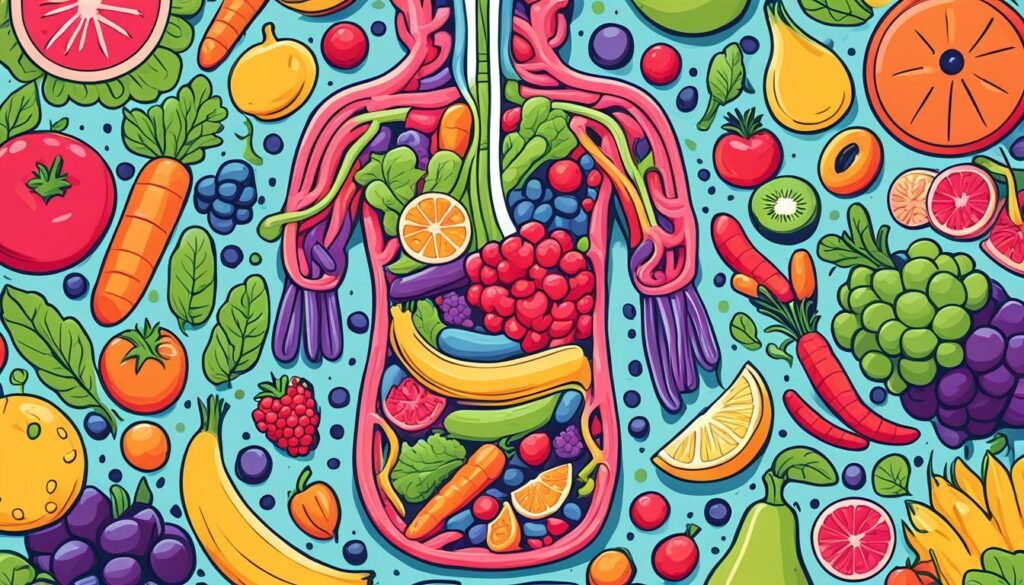
| Study Findings | Implications |
|---|---|
| 4 tested non-nutritive sweeteners (NNSs) altered the gut bacteria and the molecules they secrete in the participants17. | Suggests potential impact of artificial sweeteners on gut microbiome composition and function. |
| Microbiome changes occurred in response to NNSs, impacting glycemic responses in healthy individuals17. | Indicates that gut microbiome alterations may lead to metabolic changes, including impacts on blood sugar regulation. |
| Saccharin and sucralose consumption led to a significantly elevated glycemic response in the study participants17. | Highlights the potential for certain artificial sweeteners to disrupt glucose homeostasis. |
| Researchers transplanted gut bacteria from the study participants into germ-free mice, which exhibited glycemic responses similar to human microbiome donors17. | Suggests a causal relationship between gut microbiome alterations and metabolic changes, with potential implications for personalized nutrition and health. |
The effects of artificial sweeteners on the gut are still being studied. Some evidence suggests they could change our gut bacteria. But, we’re not certain yet, and more research is required to understand their full impact on our health171819.
Long-Term Safety of Artificial Sweeteners
Decades of Research and Approval
For many years now, people have been able to enjoy artificial sweeteners safely. The US FDA says six types are okay to use: saccharin, aspartame, acesulfame-K, sucralose, neotame, and advantame20. Cyclamate, once found with cancer ties, was cleared later on after more looks20. In 2000, saccharin was no longer on the cancer-causing list20.
Aspartame might cause liver cancer, says the IARC, but this is not certain. People still debate if sweeteners boost cancer risks20. One study even found a small rise in cancer chances with more sweeteners eaten20.
Saccharin might not raise the risk of bladder cancer after all20. No big link to cancer in people has been seen with sucralose either20. Acesulfame-K, however, was tied to more cancer in a French study20. But, not much is known about neotame and advantame yet20.
Using sweeteners might affect cancer risks by changing stuff like body weight. But conclusions are not clear yet20. A big French study did find more heart problems in those who often had sweeteners21. Some sweeteners seem more harmful for the heart than others21.
While the effects are still up for debate, many health groups agree. They say sweeteners are okay if you don’t have too much20. Before these sweeteners were allowed, lots of safety checks were done. The results all pointed to them being safe when eaten over a long time20.
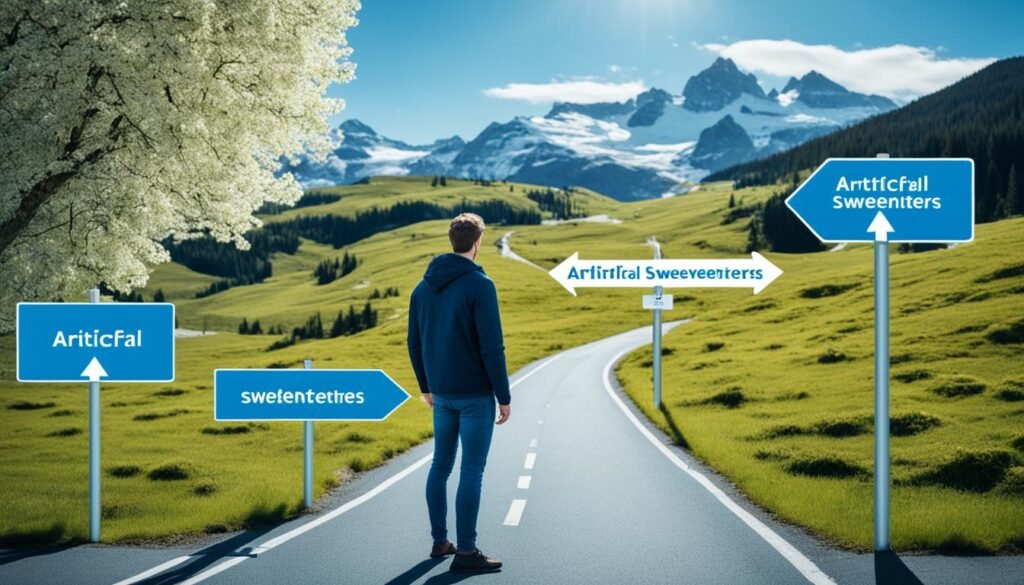
But, long-term and daily use of sweeteners could lead to serious health problems. These include more risk of kidney cancer and other issues22. They caution against too much of these sweeteners. Also, people with some health issues need to talk to a doctor first222021.
Alternatives to Artificial Sweeteners
Although the FDA states artificial sweeteners are safe, some look for natural options23. These choices let us enjoy sweetness without artificial chemicals. I’ll discuss some top natural sweeteners and what we know about them.
Stevia: A Natural Low-Calorie Option
Stevia comes from the Stevia rebaudiana plant. It’s a natural sweetener that’s very low in calories and quite sweet, up to 300 times more than sugar23. The FDA says it’s safe to use and is becoming a popular choice instead of sugar23. Yet, the studies on its long-term health effects are still rare.
Monk Fruit Sweetener: A Natural Zero-Calorie Option
Monk fruit sweetener is made from the monk fruit, a small fruit found in Asia. It’s a sweetener that has no calories and is up to 200 times sweeter than sugar23. While the FDA marks it as safe, little is known about using it in the long run.
Sugar Alcohols: Partially Calorie-Reduced Options
Erythritol, xylitol, and sorbitol are common sugar alcohols. They cut down on calories a bit, providing about 2.6 calories per gram24. They are endorsed by the American Diabetes Association but may affect blood sugar and cause stomach troubles for some24.
Natural sweeteners are good alternatives to artificial ones. But, we have to remember the data on their long-term safety is limited compared to artificial sweeteners23. When choosing, it’s wise to think about your health needs and talk to a health expert.
| Sweetener | Sweetness Level | Calorie Content | FDA Approval Status |
|---|---|---|---|
| Stevia | 300 times sweeter than sugar | Zero calories | Generally Recognized as Safe (GRAS) |
| Monk Fruit | 200 times sweeter than sugar | Zero calories | Generally Recognized as Safe (GRAS) |
| Sugar Alcohols (Erythritol, Xylitol, Sorbitol) | Varies, typically 0.2-1 times sweeter than sugar | 2.6 calories per gram | Approved as food additives |
Artificial sweeteners are well-studied and safe, but some prefer natural ones like stevia, monk fruit, and sugar alcohols23. These alternatives differ in sweetness and calories. The research on their long-term use is less23. What’s best for you? It’s good to talk to a doctor before choosing.
Regulatory Bodies and Approval Process
Artificial sweeteners go through a tough approval process. The US Food and Drug Administration (FDA), European Food Safety Authority, and World Health Organization test them25. Before you can eat them, they study the safety a lot, even looking at long-term effects26.
These sweeteners have to be very safe and have a limit on how much you can eat every day before they’re allowed in foods. Over many studies, they make sure these sweeteners won’t harm you26. Organizations like the FDA keep checking that these sweeteners are still safe by looking at new science and international research26.
Rigorous Testing and Safety Standards
The FDA has looked at over 90 studies about acesulfame potassium (Ace-K) to make sure it’s safe. They checked for any harmful effects it might have on our bodies26. Aspartame was studied in more than 100 research projects to see if it’s safe to eat. These studies covered how it might affect our bodies and if it could cause cancer26. The FDA reviewed over 110 studies on sucralose. They looked at its possible effects on our health and the results of diabetes studies26.
Aspartame, sucralose, and acesulfame potassium are all much sweeter than sugar. So, we only need a little bit to get the same sweetness. This makes them good substitutes for sugar in food and drinks26. Aspartame is used in many foods and drinks because it’s about 200 times sweeter than sugar26. Sucralose is even sweeter, at about 600 times the sweetness of sugar. It’s used in a lot of different types of foods26. Neotame is the sweetest of them all, being 7,000 to 13,000 times sweeter than sugar, and it’s still safe to eat26.
Thanks to these strict tests, artificial sweeteners are a safe choice compared to sugar. The goal is to keep us healthy while giving us more options in the foods we enjoy. This process shows we can make progress in how we sweeten our food, all the while caring for our health262725.
Balancing the Pros and Cons of Artificial Sweeteners
The safety and effects of artificial sweeteners are still under debate. Most scientific studies show they are safe when used as advised. But, some people worry about their possible negative effects28.
Artificial sweeteners let us enjoy the sweet taste without extra calories and sugar. This is great for people with diabetes or those watching their weight. For example, switching from sugary drinks to diet ones can lower BMI by 1.3–1.7. Choosing low sugar foods can help you lose up to 2.9 pounds (1.3 kg)29.
Yet, some research hints that too much can lead to health problems like cancer. But these findings do not directly link the sweeteners to these issues. More studies are necessary to really know their long-term effects30.
For those concerned about artificial sweeteners, there are natural sweet options. These are less sweet than the 600 times sweeter artificial sweeteners. You can find these artificial sweeteners in many foods and drinks. From sugarless sodas to cookies and salad dressings30.
Deciding to use artificial sweeteners involves considering their benefits. Think about the calorie cuts and help for diabetes. Remember, discussing this with a healthcare provider is always a good idea30.
Remember, using artificial sweeteners in moderation is essential. And making sure you eat a variety of healthy foods is crucial. Always aim to make choices that match your personal health and taste needs30.
Conclusion
Artificial sweeteners seem safe when used according to limits31. Many groups and lots of studies say they are okay to use. Though, there’re still talks about long-term effects. The top-notch research shows they are not bad or risky32. They help lower calories and sugar in your diet. This is good if you’re trying to be healthier. But, always think about what you like and keep a balanced diet.
Recent facts show the big problem of obesity in the U.S. It costs over $254 billion every year. Using artificial sweeteners might help control your weight. This could lower health problems related to obesity. Yet, careful use is key. Some research hints at possible downsides, like messing with your gut health and metabolism.
So, it’s up to you if you want to try artificial sweeteners. Talk to your doctor to see if they fit your health plan and likes33. As we learn more about these sweeteners, keep an open mind. Always look at what real and good science says. Try to fully understand how they fit into a healthy and balanced life313233.
FAQ
Are artificial sweeteners bad for you?
What are the main types of artificial sweeteners and are they safe?
Is the “natural” vs “artificial” sweetener distinction important?
Do artificial sweeteners impact blood sugar and insulin levels?
Is the scientific evidence on artificial sweeteners safety consistent?
Can artificial sweeteners help with weight loss?
Do artificial sweeteners negatively impact gut health?
How long have artificial sweeteners been studied and approved as safe?
What are some natural sweetener alternatives to artificial sweeteners?
How are artificial sweeteners approved as safe for use?
Source Links
- https://uscvhh.org/share/the-bitter-truth-about-artificial-sweeteners.html – The Bitter Truth about Artificial Sweeteners | USC Verdugo Hills Hospital
- https://www.ncbi.nlm.nih.gov/pmc/articles/PMC4899993/ – Artificial sweeteners as a sugar substitute: Are they really safe?
- https://www.hopkinsmedicine.org/health/wellness-and-prevention/facts-about-sugar-and-sugar-substitutes – Facts About Sugar and Sugar Substitutes
- https://www.nhs.uk/live-well/eat-well/food-types/are-sweeteners-safe/ – The truth about sweeteners
- https://www.mayoclinic.org/healthy-lifestyle/nutrition-and-healthy-eating/in-depth/artificial-sweeteners/art-20046936 – Pros and cons of artificial sweeteners
- https://www.uhone.com/health-and-wellness/healthy-living/myths-and-facts-about-artificial-sweeteners – Myths and facts about artificial sweeteners
- https://mspgym.com/uncategorized/debunking-myths-about-artificial-sweeteners-a-scientific-perspective – Debunking Myths About Artificial Sweeteners: A Scientific Perspective – Midwest Strength and Performance
- https://www.ncbi.nlm.nih.gov/pmc/articles/PMC7014832/ – Effect of artificial sweeteners on insulin resistance among type-2 diabetes mellitus patients
- https://www.mayoclinic.org/diseases-conditions/diabetes/expert-answers/artificial-sweeteners/faq-20058038 – Artificial sweeteners: Any effect on blood sugar?
- https://www.ncbi.nlm.nih.gov/pmc/articles/PMC9655943/ – Is the Use of Artificial Sweeteners Beneficial for Patients with Diabetes Mellitus? The Advantages and Disadvantages of Artificial Sweeteners
- https://health.clevelandclinic.org/whats-worse-sugar-or-artificial-sweetener – This Is What Makes Artificial Sweeteners So Bad for You
- https://www.ncbi.nlm.nih.gov/pmc/articles/PMC10822749/ – The Impact of Artificial Sweeteners on Human Health and Cancer Association: A Comprehensive Clinical Review
- https://www.bswhealth.com/blog/sugar-substitutes – The truth about artificial sweeteners
- https://www.ncbi.nlm.nih.gov/pmc/articles/PMC2892765/ – Gain weight by “going diet?” Artificial sweeteners and the neurobiology of sugar cravings: Neuroscience 2010
- https://www.ncbi.nlm.nih.gov/pmc/articles/PMC7817779/ – The Impact of Artificial Sweeteners on Body Weight Control and Glucose Homeostasis
- https://dornsife.usc.edu/news/stories/artificial-sweeteners-for-weight-loss/ – WHO’s recommendation against the use of artificial sweeteners for weight loss leaves many questions unanswered
- https://www.medicalnewstoday.com/articles/do-no-calorie-artificial-sweeteners-have-any-effect-on-gut-health-or-metabolism – Sweeteners and gut health: No calories does not mean no health effects
- https://www.ncbi.nlm.nih.gov/pmc/articles/PMC6363527/ – Effects of Sweeteners on the Gut Microbiota: A Review of Experimental Studies and Clinical Trials
- https://www.ncbi.nlm.nih.gov/pmc/articles/PMC10144565/ – Effect of Non-Nutritive Sweeteners on the Gut Microbiota
- https://www.cancer.gov/about-cancer/causes-prevention/risk/diet/artificial-sweeteners-fact-sheet – Artificial Sweeteners and Cancer
- https://www.bhf.org.uk/informationsupport/heart-matters-magazine/news/behind-the-headlines/are-artificial-sweeteners-safe – Are artificial sweeteners safe?
- https://www.verywellhealth.com/artificial-sweeteners-5184450 – Are Artificial Sweeteners Bad for You?
- https://familydoctor.org/sugar-substitutes/ – Sugar Substitutes – familydoctor.org
- https://www.health.com/nutrition/10-artificial-sweeteners-and-sugar-substitutes – 10 Artificial Sweeteners and Sugar Substitutes
- https://www.livescience.com/are-artifical-sweeteners-bad-for-you – Are artificial sweeteners bad for you?
- https://www.fda.gov/food/food-additives-petitions/aspartame-and-other-sweeteners-food – Aspartame and Other Sweeteners in Food
- https://www.ncbi.nlm.nih.gov/pmc/articles/PMC7911612/ – Knowledge and Perceptions of Non-Nutritive Sweeteners Within the UK Adult Population
- https://www.bannerhealth.com/healthcareblog/teach-me/are-artificial-sweeteners-really-worth-it – The Pros and Cons of Artificial Sweeteners | Banner Health
- https://www.healthline.com/nutrition/artificial-sweeteners-good-or-bad – Artificial Sweeteners: Good or Bad?
- https://www.popsugar.com/nutrition/artificial-sweeteners-49176803 – Are Artificial Sweeteners Actually Bad For You?
- https://www.technologynetworks.com/applied-sciences/articles/artificial-sweeteners-the-good-and-the-bad-383329 – Artificial Sweeteners: The Good and the Bad
- https://www.sciencedirect.com/topics/agricultural-and-biological-sciences/artificial-sweeteners – Artificial Sweeteners – an overview
- https://sc.edu/about/offices_and_divisions/research/news_and_pubs/caravel/archive/2012/2012-caravel-artificial-sweeteners.php – Replacing Sugar with Artificial Sweeteners: Is the Replacement of Sugar with Artificial Sweeteners an Effective Strategy for Weight Loss? – Office of the Vice President for Research
